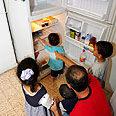
According to the report, child poverty grew by about 50 percent since 1988, with about a third of all children living below the poverty line. Meanwhile, 28,000 additional families dropped below the poverty line in 2004, comprising 107,000 Israelis, 61,000 of them children.
Currently, 20.3 percent of families are poverty stricken, compared to 19.3 percent a year ago, the report said.
National Insurance Institute Head Yigal Ben-Shalom said in response to the report, “I call on the government to provide solutions to issues related to the poverty-stricken children, as they will ultimately contribute less to the country in their situation.”
Moving toward work-oriented culture
He added that households cannot exist on NIS 1,777 (USD 395) a month, claiming that despite the rise in real wages, the relative rate of pensions has been eroded, as has the standard of living of those who receive them.
Although the general standard of living has gone up, the three lower classes have been left behind, Ben-Shalom said.
The report said the situation of poverty-stricken families has taken a turn for the worse in 2004, as their income has dropped even further below the poverty line.
Finance Ministry Media Consultant Amir Gilat said in response to the report’s findings, “the report shows that two-thirds of the poverty is concentrated in the ultra-Orthodox and Arab sectors, which are characterized by families with an above average number of children and a low employment rate.”
“The report relates to figures from last year, during which these sectors moved from the pension to a work-oriented culture,” he said. “In 2005 we can already see that many people from these sectors have sought employment. Economic growth, the move toward a work-oriented culture and aid for those who cannot work – this is the way to beat poverty.”
Knesset Member Ehud Rassabi (Shinui) said the report proves the current economic policy is pushing the middle-class toward poverty, adding that social gaps are widening as well.
“The improvement in the economic situation requires the allocation of funds toward social issues,” he said. “I call on my fellow Shinui members to demand the government take advantage of (Binyamin) Netanyahu’s escape from the Finance Ministry to change the 2006 budget’s priorities in favor of the middle and lower classes.”















